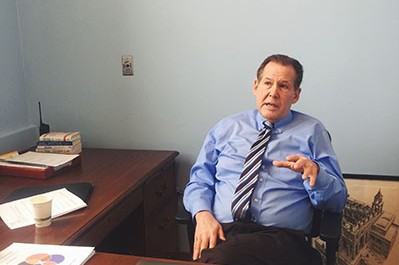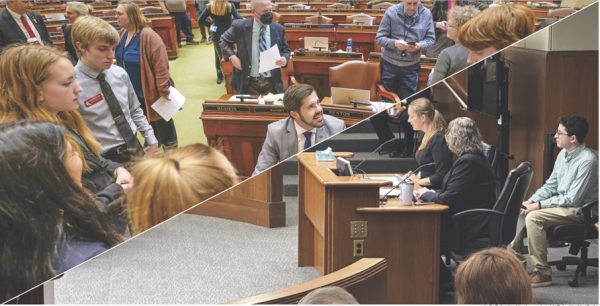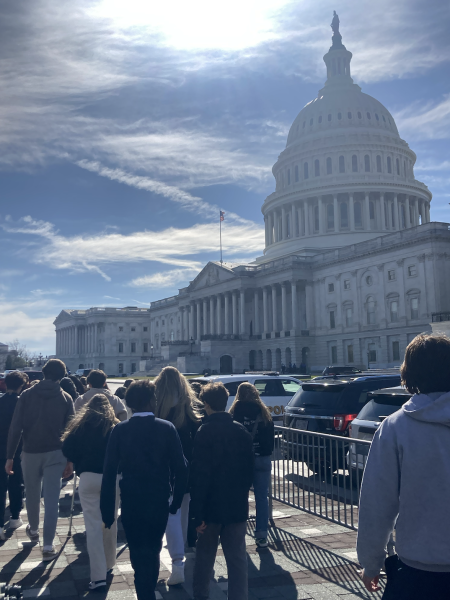Defeating Cheating May Not Be That Easy
A spike in academic honesty calls for administrative action–and a look into student lives

Associate Director Paul Menge considers ways to curb the recent spike in academic honesty infractions.
Origins of the Problem
At the beginning of each year, students sign a pledge that lays out clear guidelines for academic honesty. Students must “acknowledge that if there is any uncertainty about whether a given action is academically honest (e.g.: uncertainty about the permitted level of collaboration), it is my responsibility to seek clarification from my teacher or from the Blake Student Handbook (available on Moodle) before submitting work.”
Even with the academic honesty pledge, cheating persists. One potential cause noted by students was a lack of clarity from teachers. Upon being asked if cheating guidelines were clear, Franklin Linderman ‘18 said “not really.” Linderman explains that teachers give students syllabuses, but “no one actually reads them… They have to tell us. They have to beat it into us.” While Linderman obviously didn’t mean this literally, his stance encapsulates the thoughts of many students interviewed: teachers need to be more transparent with their policies.
However, CJB generally rejects appeals such as Linderman’s hypothetical plea for ignorance. CJB member Niki Anderson ‘17 said, “there is a lack of clarity between teachers and students, but at the same time, a lot of that is the students’ responsibility to ask for clarity.” Patrick Clark ‘16, another CJB member, concurred, citing the pledge: “it clearly says… that [students] are responsible for figuring out [whether something is cheating or not] before they do something that’s iffy.”
An increase in pressure was also identified as a root cause for academic dishonesty. Clark explains, “there’s always an increase in pressure. Every year, college [acceptance] gets more and more competitive, and that turns into this being a college preparatory school. Kids are under a lot of pressure to do well so they can go to the college of their choice. On occasion that will mean breaking the rules in order to succeed.”
Technological advances, such as the use of the Apple Watch and Sparknotes, were also noted. Upper School Director Joe Ruggiero acknowledged that “it’s becoming easier and easier to [cheat] … we’re probably going to get to a point where you can’t police it, and more and more people are going to be able to get away with it if they choose to.” With an increasing burden of schoolwork and simpler shortcuts, it is certainly becoming harder to resist the inclination to cheat.
The Call for Integrity
Despite mounting pressure, CJB members and faculty alike highlighted the need to maintain integrity. Anderson explained, “it can be tempting for kids to cheat, but really what we often say on the CJB is that morals form the backbone of who we are as a school community. So in the face of the temptation to cheat, you have to be willing to uphold these morals.”
Assistant Upper School Director Paul Menge maintained that “sometimes the work is hard, but we expect ourselves to do it a certain way. That helps define who we are.” Menge continued, “there’s no arguing what integrity is… academic dishonesty is not behavior that reflects integrity. [Academic honesty] is not an option, it’s an expectation.”
Administrative Solutions
Several ideas have been proposed to try to reduce cheating. Ruggiero proposed expanding the pledge to the home: “currently the academic honesty pledge is signed by students at the beginning of the year. I would love to see it also signed by parents… it’s an important conversation the student should have at home as well [as at school].” Menge and Ruggiero also touched on increased reminders for students, and more advisory discussions on the importance of integrity.
CJB is also considering its own changes. Anderson delineated the future proposition: “we’re working with Forum and the administration and the faculty to try and develop a plan. We’re also re-looking at the charter of the CJB and thinking about how we could possibly make it a more proactive organization in the student body to help prevent these occurrences.”
Another idea raised was the signing of an academic honesty pledge before each test. AP Biology and Chemistry teacher Deborah Weiss uses this policy, and explains its benefits: “it allows me to … give a take home portion to an exam. There’s an expectation that you will use the resources you’re allowed to and that you won’t use others. So I have a long talk with kids, and I say ‘I hope your signature means as much to you as it means to me.’” Weiss takes academic honesty very seriously, contending that “to let [students] slide and to think that they’ve gotten away with something is so detrimental to them going forward. So I pursue things because I think it’s important for the kid to realize and own their mistakes while the consequences are much lower.”
Student Solutions
To help stem the tide of cheating, first know there are other options. Menge described, “it’s pretty clear in a place that has as much support as we do, with an advisory, and a dean, and teachers who are very caring about their students, there are a lot of options to go through in terms of managing your work before one would cheat.” Ruggiero put it simply, imploring students to “ask for help … Just be honest. Go up and say, ‘I know I have this paper due tomorrow, there’s no way I’ll be able to get it in unless I plagiarize. Can I have an extension?’ That negotiation is not only honest, above board, and is an example of integrity, but nine times out of ten [it] will help you avoid a potentially disastrous situation.”
With so much negativity surrounding the issue, finding silver linings can be difficult. Despite this, Menge noted, “the vast majority of students, the vast majority of the time, understand and uphold academic honesty. It’s those times when you get into a crunch, that you have to be reminded to make the right choice. But we don’t want anyone [cheating].”
There’s no spinning the numbers; cheating is on the rise. Without currently implementing any clear cut initiatives, the plague of cheating is an ongoing issue, and has yet to show any signs of being defeated.
















